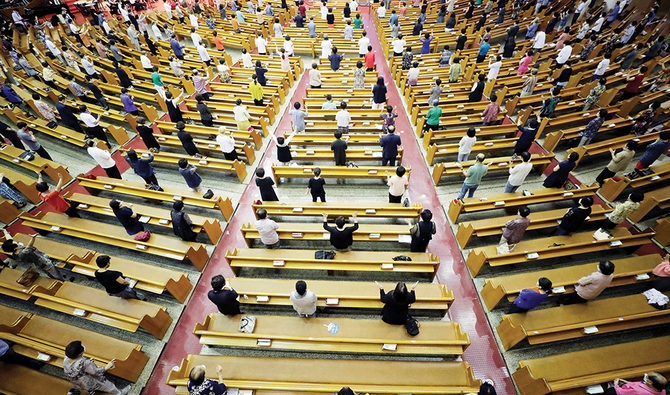SEOUL: South Korea on Sunday tightened coronavirus restrictions following the highest single-day spike in cases across the country since March, with a majority traced to public gatherings at churches, schools and restaurants.
Churches in the capital area continue to be major infection clusters. Worshippers have been blamed for not sticking to anti-virus measures after several of them were seen without face masks, singing hymns in close proximity, and sharing meals.
“It is a very senseless act that hampers efforts of containing the spread of the coronavirus,” President Moon Jae-in said on Sunday in a Facebook message. “It is a clear challenge to the national disease control and prevention system.” He announced that the government would take “very stern and strong measures,” resorting to compulsory steps if needed.
More than 279 cases have been reported across the country in the past 24 hours, adding to the national caseload of 15,318 infections, according to the Korea Centers for Disease Control and Prevention (KCDC).
The number was the highest since March 8, when the country’s tally stood at 367. Of the 279 new cases, 267 were local transmissions and the highest since early March.
The surge was reported a day after the government reimposed stricter social distancing measures in Seoul and its surrounding province on Saturday to curb the spread of the outbreak.
Under the level two measures, indoor public gatherings are limited to 50 people and outdoor events to 100, while the public can no longer attend sporting events and government-run public facilities are being closed.
“The spread of coronavirus is very serious for Seoul and Gyeonggi Province as the confirmed cases almost doubled in a day,” Prime Minister Chung Sye-kyun said in a televised address on Saturday. “We put a priority on stopping the virus from spreading further in the capital area.”
Tens of thousands of demonstrators, led by a Christian sect and conservative groups, took to the streets on Saturday in protest against the president’s left-leaning policies.
Health authorities, however, are worried about the second wave of infections.
“We see signs that cases without symptoms or with mild symptoms, undetected for some time, may have been silently spreading in the local community, leading to outbreaks linked to churches, door-to-door sales, workplaces, markets and schools,” Kwon Jun-wook, KCDC’s deputy director, told reporters on Thursday.
The government accused pastor Jun Kwang-hoon, who led the demonstration, of breaking a ban on rallies and obstructing investigations into the country’s biggest outbreak in five months.
According to the KCDC, infections tied to Jun’s Sarang Jeil Church in northern Seoul swelled to 249 as of Sunday, while cases linked to a church in Gyeonggi Province increased to 126.
Besides churches, several clusters in the past week were found at restaurants, cafes and traditional markets where an unspecified number of individuals had gathered.
Experts said the government’s move was a step in the right direction.
Prof. Eom Joong-shik, of the Infectious Diseases Department at Gachon University Medical Center in Incheon, called for more stringent restrictions to curb the spread of the virus.
“For the past (few) months we saw the number of COVID-19 cases decrease, but the ‘silent period’ could be the most dangerous time,” he told Arab News. “People have been relieved of their alertness, joining gatherings and events, so we don’t know when and where the so-called silent transmission occurs.”
Ki Mo-ran, a professor at the National Cancer Center, added that the government should be “more proactive” in testing for the virus.
“What I’m concerned about is that many of the new patients are the elderly (and) belonging to churches, as the elderly are more vulnerable to the virus,” she said. “In this regard, the government should expand its testing scope to detect and curb the virus spread.”




























